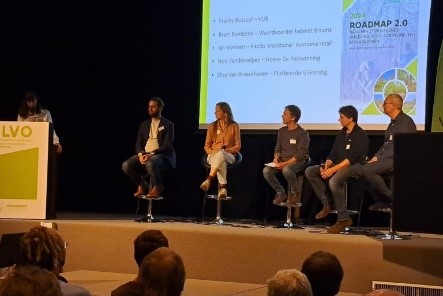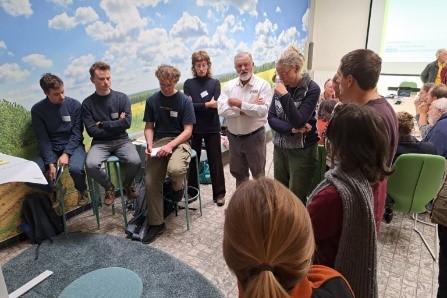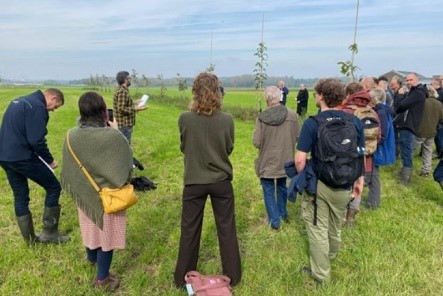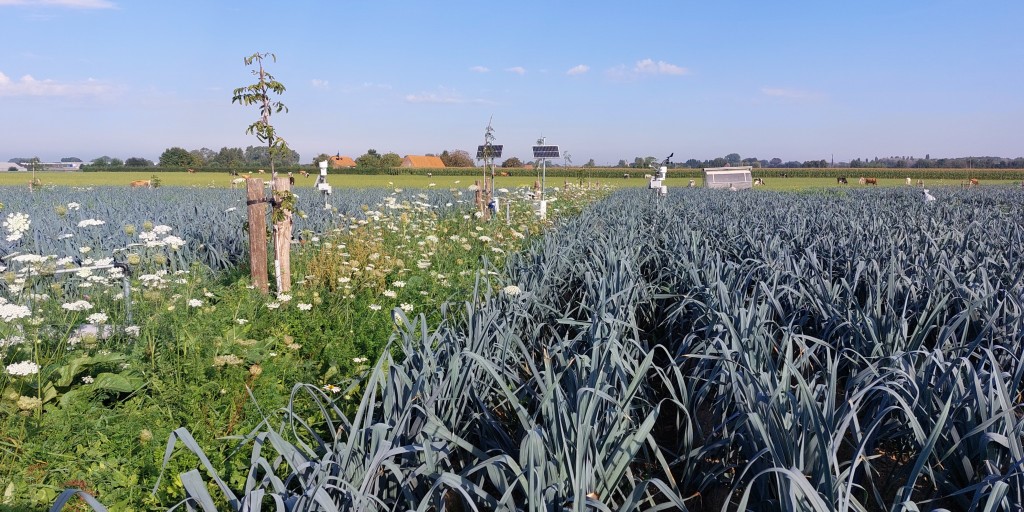Op 15th van oktober 2024 organiseerde ILVO het agroforestry-evenement van het jaar: 'Landbouw met bomen: de weg naar 2035'. Meer dan 200 boeren, onderzoekers, beleidsmakers en andere belanghebbenden kwamen samen om de toekomst van agroforestry in Vlaanderen te bespreken. Het evenement stond in het teken van 10 jaar onderzoek door het Consortium Agroforestry Vlaanderen, waarvan Inagro ook lid is, en focuste op de verdere ontwikkeling van agroforestry tegen 2035. Hier zijn enkele belangrijke hoogtepunten, inclusief alle presentaties en video's die aan bod kwamen.
Nieuwe handleiding - Bewezen voordelen van agroforestry
De afgelopen tien jaar hebben de partners van het Agroforestry Consortium Vlaanderen meegewerkt aan meer dan 20 projecten gericht op onderzoek, kennisuitwisseling, leernetwerken, ondersteuning van landbouwbedrijven, beleidsontwikkeling en implementatie in de praktijk. Dit leverde substantiële gegevens op over de impact van bomen op de productie van gewassen, bodemkwaliteit, koolstofopslag, biodiversiteit en winstgevendheid. Daarnaast heeft het consortium kennisfiches, digitale hulpmiddelen ter ondersteuning van de besluitvorming, online trainingsmodules en een agroforestrykaart ontwikkelddie allemaal zijn opgenomen in het handboek.
Na tien jaar onderzoek heeft de voordelen van agroforestry zijn duidelijk:
- tot 7 ton extra CO₂-opslag per hectare per jaar
- een beschermend microklimaat
- beter waterbeheer
- verhoogde biodiversiteit
- en een hogere algehele productiviteit. Hoewel gewasopbrengsten gemiddeld met 20% kunnen afnemen door concurrentie met bomen, wordt dit verlies gecompenseerd door de bijdrage van de bomen aan klimaatadaptatie en de productie van hout, noten en fruit. Agroforestry creëert ook mogelijkheden voor nieuwe inkomstenstromen, zoals de lokale productie van noten, vruchtensappen en ciders.
Handmatig Agroforestry in Vlaanderen 2014-2024: Een gids na 10 jaar onderzoek en praktijk.
Keynote en paneldiscussie
Mark Shepard, een Amerikaanse pionier in regeneratieve landbouw, opende de dag met een inspirerende keynote over waterbeheer en de rol van agroforestry in klimaatadaptatie. Shepard benadrukte het belang van bomen in het vasthouden van water en het creëren van veerkrachtige landbouwsystemen.
De paneldiscussie bracht experts samen, waaronder Elise Van Broeckhoven (Plukboerderij Grondig), Nico Vandervelpen (Hoeve De Peinwinning) en Franky Bossuyt (VUB). Ze verkenden de uitdagingen en kansen in agroforestry en gingen na hoe wetgeving, beleid en markten boeren die agroforestry willen toepassen in hun landbouwpraktijken beter kunnen ondersteunen.
Workshops: Praktische inzichten en hulpmiddelen
Het evenement omvatte ook een reeks interactieve workshops, die de deelnemers praktische kennis bijbrachten over verschillende aspecten van agroforestry:
AGROFORESTRY EN BELEID: KANSEN EN UITDAGINGEN
Deze workshop richtte zich op de juridische en beleidsmatige uitdagingen rond agroforestry. Deelnemers deden inzichten op uit buurlanden en werkten samen om oplossingen te bedenken die belemmeringen voor boeren kunnen wegnemen. Er werd ook gesproken over de nood aan experimentele flexibiliteit en steun voor pionierende boeren.
DE AGROFORESTRYPLANNER GEBRUIKEN
Deelnemers leerden hoe ze de Agroforestry Planner kunnen gebruiken, een beslissingsondersteunend hulpmiddel voor het ontwikkelen van hun eigen agroforestryprojecten. Het hulpmiddel helpt bij het selecteren van boomsoorten, het uitvoeren van kosten-batenanalyses en het inschatten van het potentieel aan koolstofopslag.
ONDERZOEK EN REGENERATIEVE LANDBOUW
Mark Shepard sloot zich aan bij onderzoekers om de toekomst van agroforestry en regeneratieve landbouw te bespreken. De workshop richtte zich op waterbeheer en het belang van blijvende investeringen in agroforestryonderzoek om veerkrachtige landbouwsystemen te ontwikkelen.
Inagro is zeer betrokken bij dit onderwerp. Ons project AFaktive benadrukt agroforestry als sleutel tot verbetering van waterbeheer en aanpassing aan extreme weersomstandigheden.
DE FINANCIËLE KANT VAN AGROFORESTRY
Deze workshop behandelde de winstgevendheid van agroforestry en potentiële verdienmodellen. Deelnemers bespraken de uitdagingen van markttoegang voor agroforestryproducten en onderzochten manieren waarop boeren risico's kunnen beperken door productlijnen te diversifiëren (bijv. hout, noten, fruit).
LEERNETWERKEN IN AGROBOSBOUW
Deze sessie zoomde in op de ervaringen van lerende netwerken waar boeren en onderzoekers kennis delen. De nadruk werd gelegd op het bevorderen van samenwerking en het ondersteunen van boeren tijdens hun hele agroforestrytraject.
VELDBEZOEKEN
Tijdens het veldbezoek kregen de deelnemers een kijkje op een van de experimentele agroforestrylocaties bij ILVO. Deze kennisuitwisseling maakt deel uit van Inagro's REFOREST project, dat als doel heeft de adoptie van agroforestry te verbreden en barrières aan te pakken voor het opschalen ervan in heel Europa.
In de video's hieronder nemen we je niet alleen mee naar de proeftuin van Ilvo, maar ook naar die van Inagro en Praktijkpunt Vlaams-Brabant:
Agroforestry ambassadeurs
Tijdens het evenement werden drie Agroforestry Ambassadors in het zonnetje gezet voor hun cruciale rol in de promotie van agroforestry in Vlaanderen:
- Jeroen Watté - Voormalig medewerker van Wervel, heeft Watté als agro-ecoloog een cruciale bijdrage geleverd in het op de kaart zetten van agroforestry in Vlaanderen. Hij was jarenlang bestuurslid van EURAF en is nu innovatiemakelaar voor agro-ecologie.
- Louis-Marie Tennstedt & Wouter De Stecker - Vertegenwoordigen 4SE, een agroforestry gedreven familieboerderij in Pajottenland, Louis-Marie pionierde met bosbouw en agroforestry praktijken, terwijl Wouter de erfenis voortzet met innovatieve percelen en boomsoorten.
- Daphne Ruigrok - Een adviseur voor beleidsimplementatie bij het Agentschap voor Landbouw en Visserij. Ruigrok speelt een sleutelrol in het begeleiden van boeren bij het toepassen van agroforestry en slaat een brug tussen beleid en praktijk.
Routekaart 2035 en volgende stappen
Het evenement werd afgesloten met de presentatie van een stappenplan dat de stappen schetst die nodig zijn om agroforestry in Vlaanderen vooruit te helpen. De vijf focusgebieden zijn onderzoek, beleid, onderwijs, economie en maatschappelijke betrokkenheid. Belangrijke voorstellen zijn onder andere het voorzien van meer experimentele flexibiliteit voor pioniers, een eerlijke prijszetting voor agroforestryproducten en verdere beleidsontwikkeling rond ecosysteemdiensten.
Met de inzichten uit onderzoek en de praktische hulpmiddelen die beschikbaar zijn, zijn Vlaamse boeren goed geplaatst om een belangrijke stap te zetten naar een duurzamer en veerkrachtiger landbouwsysteem. Het evenement onderstreepte de multifunctionaliteit van agroforestry en de noodzaak om een omgeving te creëren waarin boeren deze praktijk kunnen integreren in hun activiteiten.



